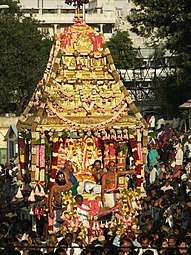Srivari Brahmotsavam
Sri Venkateswara Swami vari Brahmotsavam or Srivari Brahmotsavam is the most significant[1] annual fête celebrated at the Venkateswara Temple in Tirumala-Tirupati, Chittoor district, Andhra Pradesh, India. The feast lasts for one month during the Hindu calendar month of Āśvina, which falls between the Gregorian calendar months of September and October.[2]
| Srivari Brahmotsavams శ్రీవారి బ్రహ్మొత్సవములు | |
|---|---|
Venkateswara Vishnu temple | |
| Official name | Sri Venkateswara Brahmotsavams |
| Also called | Tirumala Brahmotsavams, Tirupati Brahmotsavams |
| Observed by | Hindus |
| Celebrations | The Malayappa (processional deity) of Venkateswara Temple, Tirumala is taken on the morning and evening of the nine-day festival on four streets around the shrine. Celebrations include dance, music, elephants and horses. |
| 2019 date | 30 September - 8 October |
| Frequency | Annual |
| Related to | Venkateswara Temple, Tirumala |
The Utsava-murti (processional deity) of the presiding deity, Venkateswara, and his consorts Sridevi and Bhudevi are taken on a procession on several vahanams on the streets surrounding the temple. The celebration attracts pilgrims and tourists from all over India and around the world. A Brahmotsavam is a cleansing ceremony in honor of Lord Brahma, and the ceremony at Tirumala is the largest.[3]
Etymology
The word Brahmotsavam is a combination of two Sanskrit words—Brahma and utsavam (festival)—and Brahma reportedly conducted the first festival. Brahma also means "grand" or "large".[4] Srivari Brahmotsavam is also known as "Venkateswara Salakatla Brahmotsavams" and "Venkateswara Navaratri Brahmotsavams".
Two festivals
When there is an extra month in the lunar calendar, two Brahmotsavam are held: Salakatla and Navarathri. Both festivals were held in 2015 and 2018.
In Salakatla Brahmotsavam, Rathotsavam (Big Chariot) is held on the morning of the eighth day; during Navratri Brahmotsavam, Golden Chariot (Swarna Rathotsavam) is held that morning of the eighth day. In Salakatla Brahmotsavam, there is a flag-lowering (Dwajaavarohanam) on the evening of the ninth day.[5]
History and legend
According to the legend of Tirumala, Brahma descends to earth to conduct the festival.[1] Sri Venkteswara Sahasranamastotra refers to Brahma performing the festival, signified by a small, empty wooden chariot (brahmaratham) which moves ahead of the processions of the Venkateswara processional deity Malayappa.[1][6]
The first reference to festivals in the Tirumala Venkateswara Temple was in 966 CE, when the Pallava queen Samavai endowed land and ordered its revenue to celebrate festivals in the temple.[7][1] Until 1582, Brahmotsavams were held as often as 12 times a year.[1]
Celebrations
The Brahmotsavam is held over nine days at the beginning of the Hindu calendar month of Āśvina, paralleling Navaratri. The evening before the first day, the rite of Ankurarpana (the sowing of seeds to signify fertility and abundance) is performed. The main first-day activity is Dwajarohana, the raising of the Garuda flag to signify the beginning of the festival. Religious activities during the festival include daily homas and processions on streets surrounding the temple. The final day commemorates Venkateswara's birth star. The Sudarshana Chakra is bathed in the temple tank with the devotees. The Chakra is then placed on a high platform, and the devotees walk under it and are blessed with its dripping water. The festival ends with Dhvajavarohanam, the lowering of the Garuda flag.
- Dwajarohanam
- A ceremony on the first day, when a flag with a picture of Garuda (the vehicle of Vishnu) is hoisted over the temple.[8] The flag is believed to be a symbolic invitation to the Hindu deities to attend the festival.[8] After the ceremony, the Andhra Pradesh chief minister offers new silk clothes to Venkateswara.[9]
- Garuda Vahanam
- On the evening of the fifth day, Venkateswara and Garuda are carried in a procession and decorated with garlands of flowers.[10] Every year, the Tirupati Venkateswara garland is sent to the Srivilliputtur Andal Temple for the marriage festival of Andal.[11]
- Hanumantha Vahanam
- On the morning of the sixth day morning, Venkateswara and Hanuman are taken out in procession.[12]
- Chakra Snanam
- On the morning of the ninth day, the Malayappa, his two consorts and the Sudarshana Chakra are carried in procession to the Varahaswamy Temple.[13] After the abhishekam and presentation of food offerings, the Sudarshana Chakra and its devotees are bathed in the temple tank.[13]
Processions
 First evening
First evening Second morning
Second morning Second evening
Second evening Third morning
Third morning Third evening
Third evening Fourth morning
Fourth morning Sixth evening
Sixth evening
See also
- Venkateswara
- Rath Yatra
- Tirumala Tirupati Devasthanams
References
- Srivari Brahmotsavam. The Hindu. 1975.
- "8th Day of Srivari Salakatla Brahmotsavam-Aswa Vahanam on Oct 12". Tirumala Tirupati Devasthanams News. 12 October 2013. Archived from the original on 18 March 2014.
- "Brahmotsavam: Why is Brahmotsavam Celebrated". Ygoy. Archived from the original on 18 March 2014.
- "Mother of all Festivals". The Hindu. 21 September 2017. Retrieved 25 October 2017.
- K, Kandaswamy. "Detailed Schedule of Brahmotsavam in Tirupati - 2 Brahmotsavam if Adhika Maas (Extra Month) comes in Lunar Calendar". Live Trend. K Kandaswamy. Retrieved 23 November 2017.
- "Tirupati dresses up for Brahmotsavam". Times of India. 7 October 2002. Retrieved 1 August 2017.
- Feminism and World Religions 1999, p. 48.
- "Tirumala Brahmotsavam begins". The Hindu. 6 October 2006. Retrieved 21 July 2017.
- "TTD gearing up for Brahmotsavams". The Hindu. 5 July 2017. Retrieved 25 July 2017.
- "Andal Mala Presented to Lord Venkateswara in Tirumala". TTD News. 29 September 2014. Retrieved 18 December 2019.
- "Srivilliputtur Andal Temple". Archived from the original on 24 October 2019.
- "Srivari Salakatla Brahmotsavam - Hanumantha Vahanam". Indian New Times 24X7. 10 October 2013. Archived from the original on 18 March 2014.
- "Grand finale to Tirumala Brahmotsavam". The Hindu. 8 October 2011. Retrieved 1 August 2017.
Sources
- "Tirupati dresses up for Brahmotsavam". The Times of India. 6 October 2002. Retrieved 18 December 2019.
- "Crafts mela to coincide with Brahmotsavam". The Hindu. 17 September 2001. Retrieved 18 December 2019.